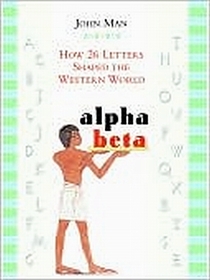Helpful Score: 2
From Amazon:
John Man's Alpha Beta is an excellent survey on the history of letters. They may have played a more dramatic role in the advancement of Western culture than most people realize: "The Greeks, so this argument runs, would not have been so influential but for the invention that fixed their writings, the invention that they named after its first two signs, alpha and beta--the alphabet." This opinion will no doubt ruffle a few feathers in the classics departments at universities, which have instructed students on the intellectual and literary achievements of the Greeks for generations. Man seems to challenge the idea that the Greeks offered something inherently worthwhile. "Possibly nothing of their oral genius would have been preserved but for a piece of astonishing good fortune. They just happened to live near one of the cultures that had stumbled on the alphabet, and they just happened to be at a crucial state in social evolution that made them open to its adoption." This is a fascinating argument, and Man makes it a compelling one, although it's also possible to believe the Greeks had the additional good fortune of producing a storyteller as good as Homer.
Most of the book is a well-told tale that runs a course from the first symbols pressed into clay tablets to the advent of the Internet--the Greeks are just a piece of it. The book covers the ancient Egyptians, Phoenicians, Etruscans, and several other cultures in some detail. One of the most interesting sections discusses the Koreans, creators of "an alphabet that is about as far along the road towards perfection as any alphabet is likely to get." Man is a colloquial writer; reading Alpha Beta is like listening to a popular college professor lecture on his favorite topic. The complex and controversial scholarship on the alphabet becomes instantly accessible to nonexpert readers on these pages. Anyone interested in the power of words and the history of civilization will find Alpha Beta irresistible.
John Man's Alpha Beta is an excellent survey on the history of letters. They may have played a more dramatic role in the advancement of Western culture than most people realize: "The Greeks, so this argument runs, would not have been so influential but for the invention that fixed their writings, the invention that they named after its first two signs, alpha and beta--the alphabet." This opinion will no doubt ruffle a few feathers in the classics departments at universities, which have instructed students on the intellectual and literary achievements of the Greeks for generations. Man seems to challenge the idea that the Greeks offered something inherently worthwhile. "Possibly nothing of their oral genius would have been preserved but for a piece of astonishing good fortune. They just happened to live near one of the cultures that had stumbled on the alphabet, and they just happened to be at a crucial state in social evolution that made them open to its adoption." This is a fascinating argument, and Man makes it a compelling one, although it's also possible to believe the Greeks had the additional good fortune of producing a storyteller as good as Homer.
Most of the book is a well-told tale that runs a course from the first symbols pressed into clay tablets to the advent of the Internet--the Greeks are just a piece of it. The book covers the ancient Egyptians, Phoenicians, Etruscans, and several other cultures in some detail. One of the most interesting sections discusses the Koreans, creators of "an alphabet that is about as far along the road towards perfection as any alphabet is likely to get." Man is a colloquial writer; reading Alpha Beta is like listening to a popular college professor lecture on his favorite topic. The complex and controversial scholarship on the alphabet becomes instantly accessible to nonexpert readers on these pages. Anyone interested in the power of words and the history of civilization will find Alpha Beta irresistible.




